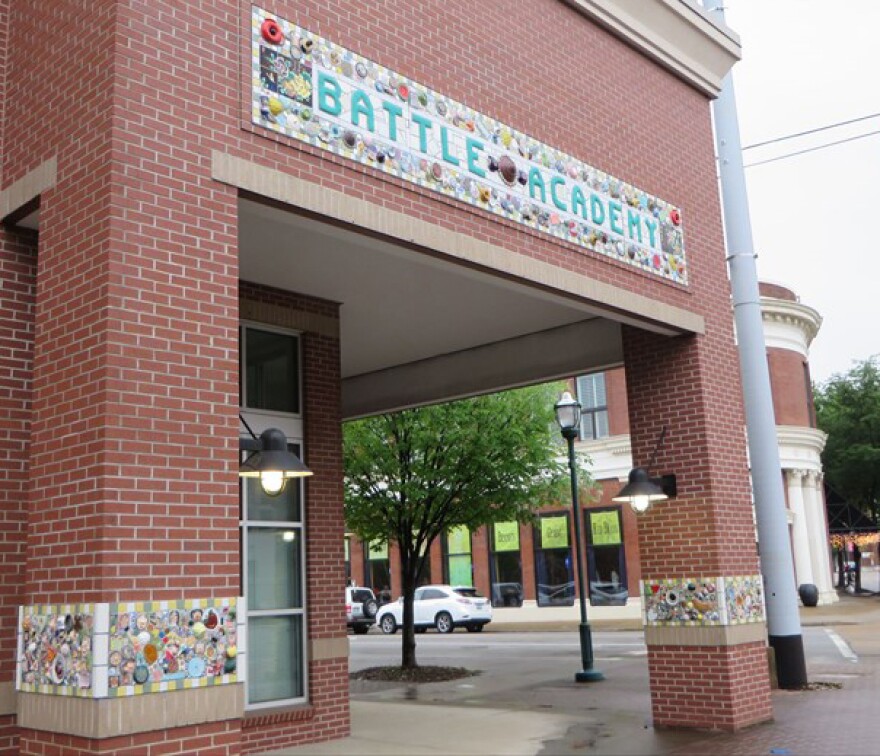
UTC students who are pursuing a career in teaching through the School of Education use Battle Academy for hands-on training. Photo by Angela Foster.
Battle Academy, an educational partner with the University of Tennessee at Chattanooga, has been named to a group of 22 schools selected statewide for its Science, Technology, Engineering, Arts and Mathematics program (STEAM) programs.
The Tennessee STEM Innovation Network gives a similar designation to STEM schools, which don’t have the arts component. It has recognized a total of 114 elementary, middle and high schools in Tennessee for their STEM and STEAM programs.
Since 2019, the UTC Arts-Based Collaborative, Challenger STEM Learning Center and the School of Education have worked with Battle to develop STEAM-related programs.
“All have become closely partnered with us to see us succeed and thrive as a truly arts-integrated school,” said Battle Academy Principal Jesse Goins.
“The assistance we have gotten from UTC is immeasurable—the partnerships, the connections, the laughter, the learning,” he said. “It’s been amazing. They pour into us, and we are better teachers for it. They love our kids. They love our mission. They love us, and we love them. “
One of the main areas of UTC and Battle Academy collaboration is through the academy’s Arts360, a grant that helps schools integrate the arts into the teaching of STEM subjects.
“It’s really thinking about how the arts being alongside STEM can really be a catalyst to understanding across all these different fields and disciplines,” said Laurie Allen, executive director of the Arts-Based Collaborative and the Challenger STEM Learning Center. “We’re really trying to build upon what they’re already doing and provide some new skillsets to the teachers.”
UTC theater majors helped Battle students produce “The Lion King KIDS,” a 30-minute musical for elementary-school performers with a curriculum tailored for third- to sixth-graders. Art majors are student teachers at Battle.
UTC students who are pursuing a career in teaching through the School of Education use Battle for hands-on training for integrating arts with other subjects, said Valerie Rutledge, dean of the College of Health, Education and Professional Studies.
“The partnership between Battle Academy and UTC offers the chance to apply new approaches, conceive of unique tasks and implement these in ways that produce exciting results,” she said. “The designation of Battle Academy as a STEAM school recognizes and highlights those efforts and showcases the talents of the faculty while using their true community-based approach to offer integration of activities and real-world experiences.
“From literacy to technology to the arts, Battle has proved to be innovative, open and enthusiastic in these efforts.”
“We have lots of teacher candidates that interact with the schools. Battle Academy has really transformed into this learning lab for our students where they get to see active learning through the arts, but also understand what STEAM can be as they go and engage with the different classrooms and the variety of different opportunities they have at Battle,” said Allen, who also is the Lyndhurst Chair of Excellence in Arts Education.
The connection between Battle and UTC is part of the University’s involvement in the Wolf Trap Institute for Early Learning Through the Arts, Allen said.
Funded at UTC by the Lyndhurst Foundation, the institute promotes performing arts for both education and enjoyment. It teaches professional artists in music, dancing, puppetry, acting and other areas how to bring their skills into classrooms and blend them with lesson plans.
Allen said that earning the STEAM designation from the Tennessee STEM Innovation Network isn’t easy. The process includes an application in which a school must give details on its STEM/STEAM programs and their results, followed by a school visit from network representatives to confirm those assertions.
“It’s not something where you just go, ‘Hey, I want to be this, and you become this,’” Allen explained. “It’s quite an ordeal to go through this.”
While the statewide network has given other public schools in the Hamilton County Schools system the STEM designation, Battle Academy is the only school to earn its STEAM title, Goins noted.
“Children need to feel successful. They need a win,” he said. “When I was a school-aged student, I never felt as if I was a scientist or mathematician. Technology was not as interesting to me either, outside of ‘Tetris’ or ‘Mario Brothers.’
“I remember feeling the most successful in music programs or home economics—by then, it was called ‘Teen Living’ classes. I knew that I would have never gone to college (first-generation), let alone make it to a doctoral program, if I hadn’t had wins along the way. I wanted to do the same for our students at Battle.”

Battle Academy is located at 1601 Market St. in Chattanooga (photo credit: Waymarking.com)
